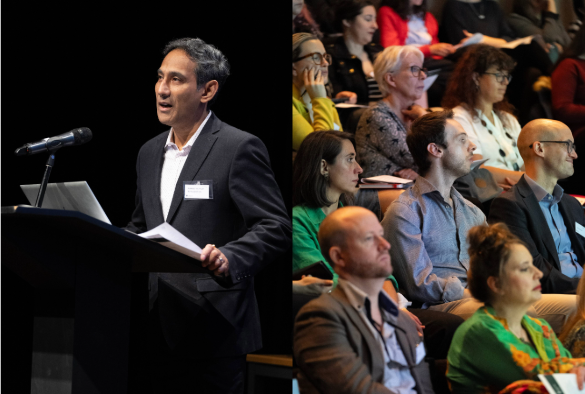
Prof Soumyen Bandyopadhyay
Heritage studies experts gathered for a programme of presentations and expert panel discussions to formally launch the University’s Heritage Institute on Wednesday 18 September.
The new institute brings together researchers from diverse disciplines who are exploring heritage to engage in knowledge exchange with both internal and external stakeholders.
Professor Anthony Hollander, Pro-Vice-Chancellor for Research & Impact opened the event by sharing the strategic aim of the institute which is to enhance the University’s international reputation and status as a pre-eminent research institution, postgraduate research and training base, and outreach in the field of heritage, its management and interpretation.
Professor Hollander highlighted the importance of heritage research within the newly adopted strategy of research frontiers for the University. Professor Fiona Beveridge, Executive Pro-Vice-Chancellor for the Faculty of Humanities and Social Sciences, also explained the journey heritage research has taken within Humanities and Social Sciences towards a formal Institute now led by the HSS Faculty.
A highlight of the day was the keynote speech delivered by Lynn Meskell, Penn Integrates Knowledge Professor in Anthropology and Historic Preservation. Her paper ‘SECURING ANTIQUITY: Weaponizing Heritage from UNESCO to NATO’ was powerful and thought provoking and spoke to many of the key issues and challenges the Institute engages with.
Strong public engagement will be a hallmark of the research outputs of the Heritage Institute, with regional, national and international partnerships a key enabler in making this a major centre of academic excellence in heritage studies.
Research in the Heritage Institute will be constructed around four key pillars:
- Difficult heritage looks at the role of heritage in post-conflict transformation and transitional justice contexts.
- Heritage on the fringes explores heritage as a catalyst for action in marginalised regions.
- Heritage futures seeks to shape meaningful futures employing heritage, design and innovation as tangible developmental assets.
- Heritage policies and processes will address emerging ethical and legal considerations for heritage protection in developing strong frameworks.
The institute members have already generated more than £10M in research funding and have set ambitious impact targets. A suite of CPD programmes for heritage professionals will be developed, as well as a re-development of existing heritage postgraduate taught and research degree offerings.
Professor Soumyen Bandyopadhyay, Director of the Heritage Institute and James Stirling Chair in Architechture said “In a world negatively impacted by conflict, deprivation, migration, and climate change we risk losing vast swathes of our embedded resilient heritage knowledge.
“Working with diverse communities and stakeholders, locally, nationally and internationally, we aim to enrich resilience through our research, training and capacity building, and by having a positive impact on society, culture and the economy.”